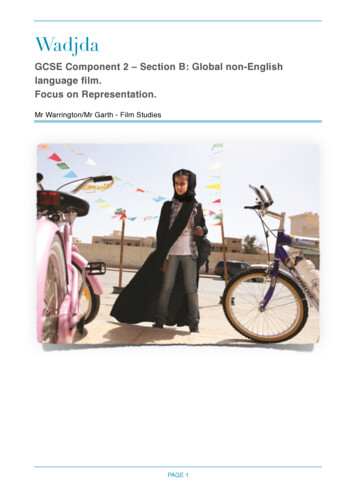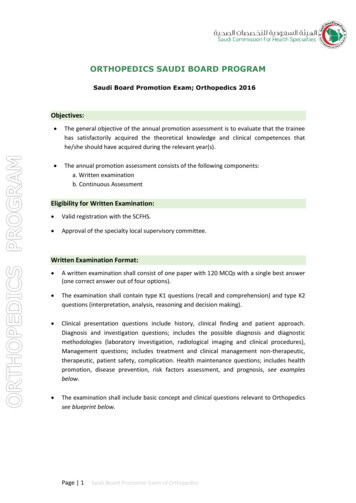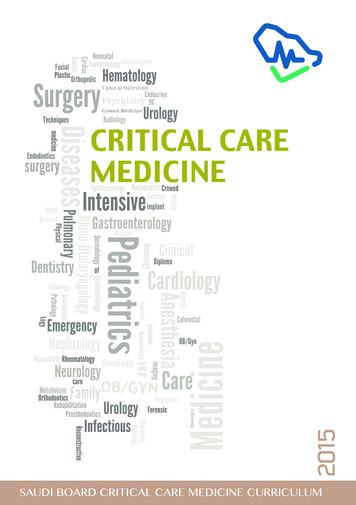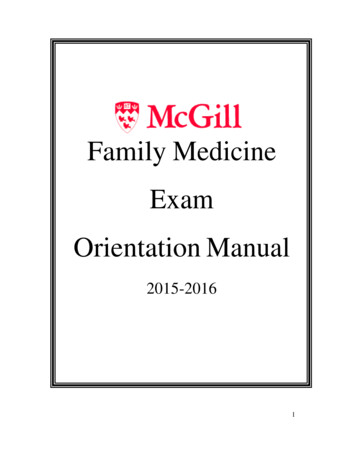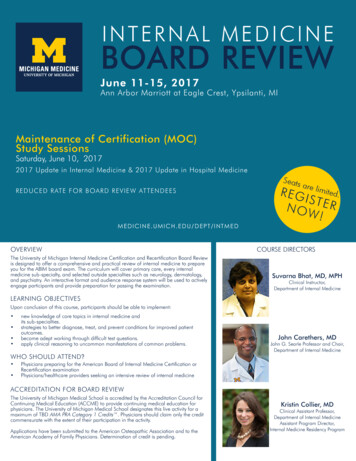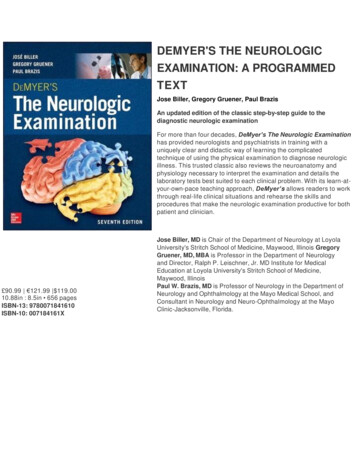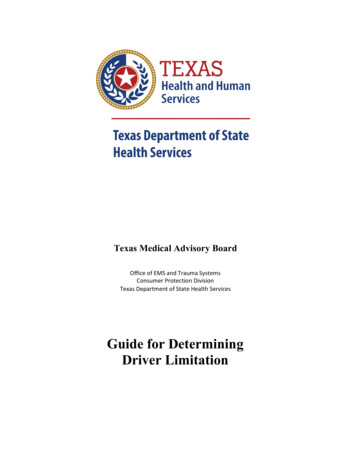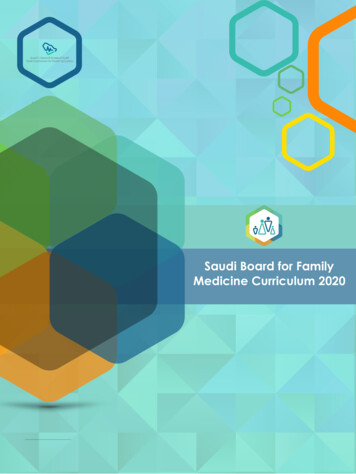
Transcription
1Saudi Board for FamilyMedicine Curriculum 2020
Saudi Board for Family MedicineCurriculum Development Team๏ Dr. Abdulaziz Aljuhani๏ Dr. Ibrahim Alarfaj๏ Dr. Mohammad Alrukban๏ Dr. Nada Albunian๏ Dr. Nora Alzamel๏ Dr. Saad AlbattalScientific Counsel of Family Medicine๏ Dr. Abdulaziz Aljuhani๏ Dr. Abdullah Alkhonaizan๏ Dr. Ahmad Almeajel๏ Dr. Ali AlMubarak๏ Dr. Bader Almutairi๏ Dr. Basema Alkhodair๏ Dr. Ibrahim Alarfaj๏ Dr. Maha Alatta๏ Dr. Mohammad Alghamdi๏ Dr. Mohammad Alrukban๏ Dr. Muneera Baraja๏ Dr. Nora Alzamel๏ Dr. Saad Albattal๏ Dr. Yousef AlshammariThe curriculum wasreviewed, edited andapproved by the SCFHSCurriculum Review Board
Saudi Board for Family Medicine Curriculum 2020Copyright and AmendmentsAll rights reserved. 2019 Saudi Commission for Health Specialties(SCFHS). This material may not be reproduced, displayed, modified, ordistributed without prior written permission from the copyright holder.No other use is permitted without prior written permission from theSCFHS, Riyadh, Kingdom of Saudi Arabia.Any amendment to this document shall be endorsed by theSpecialty Scientific Council and approved by Central TrainingCommittee. This document shall be considered effective from thedate the updated electronic version of this curriculum was publishedon the commission’s website, unless a different implementation datehas been mentioned.Correspondence-P.O. Box: 94656-Postal Code: 11614-Consolidated Communication Center: 920019393 InternationalContact Call:00-966-114179900 Fax: 4800800 Extension: 1322-Website: www.scfhs.org.sa-E-mail: curricula@scfhs.org.saFormatted and designed by: Dr. Ibrahim AlarfajIISaudiMED-FM 2020
Saudi Board for Family Medicine Curriculum 2020Table of ContentsCopyright and AmendmentsTable of ContentsAcknowledgmentsWhat is new in this version?What is next?AbbreviationsIIIIIVIIVIIIIXXChapter One:Curriculum Design MethodologyIntroductionObjectivesSituational Analysis112Conclusions and recommendations of the situational analysis 2Development of the Competency Framework3Methodology4Proposed SaudiMEDS-FM framework4Development of Curriculum StructureFinal curriculum structure design recommendationsSpecific considerations555Conclusion6Chapter Two:SaudiMED-FM 2020 Competency FrameworkIntroductionMedical 0Patient Care11Definition11Description11Competencies and sub-competencies11Communication and es13Management and 4IIISaudiMED-FM 2020
Saudi Board for Family Medicine Curriculum mpetencies16Alignment with other competency frameworks17Chapter Three: Curriculum StructureClinical Rotation21Guide21Family Medicine Rotation25Internal Medicine Rotation31Pediatric Rotation36Obstetrics and Gynecology Rotation41General Surgery Rotation46Psychiatry Rotation51Emergency Medicine Rotations (Adult and Pediatric)56Dermatology Rotation60Orthopedic and Musculoskeletal Rotation64Ophthalmology Rotation68Otolaryngology Rotation72Radiology Rotation76Didactic Courses80Weekly Academic Day Activities (WADA)80Orientation 108Volunteer examples108Research Activity:109Objectives:109Course contents:109Research supervisors109Role of the resident110Topic selection:110Joint research111Process of writing:111Leaves:Recommended References112113Introduction113IVSaudiMED-FM 2020
Saudi Board for Family Medicine Curriculum 2020Recommended textbooks113Recommended scientific websites and guidelines113Other (i.e., non-essential) resources for further reading114Chapter Four:Teaching and Learning in FM ProgramIntroductionClinical Teaching117117Teaching strategies in the clinical settings118Cognitive apprenticeship model in a clinical settings119Simulation in medical education120Teaching and Learning Styles in Academic Activity123Self-directed learning124Reflective practice125Mentorship126Definition126Five basic steps for a successful mentorship program126Mentor and mentee roles and ework for effective supervision1129Level of supervision130Chapter Five:Assessment and Evaluation in FM Program(PASS-FM)Introduction133What is the difference between formative and summative assessment? 133General RulesPASS-FM: Formative Assessment ssing Score for Promotion141PASS-FM Summative Components1411. FM Part One Exam1412. Final FM Board pendix 1: Mini-CEXAppendix 2: DOPSAppendix 3: CBDAppendix 4: ITER2468VSaudiMED-FM 2020
Saudi Board for Family Medicine Curriculum 2020Appendix 5: WADA Speaker EvaluationAppendix 6: Volunteer Assignment RegistrationAppendix 7: Research Milestones ProgressionVI101214SaudiMED-FM 2020
Saudi Board for Family Medicine Curriculum 2020AcknowledgmentsThe Curriculum Development Team (CDT) is thankful to Allah, theLord of the Worlds to bestow upon us His generosity that facilitated oursuccess in developing this curriculum, which we hope meets expectationsof its readers.We also thank those who participated in the various stages ofdevelopment, from planning and analysis, devising developmentmechanisms, focus-group discussions, and expert bodies to reviewing thecurriculum drafts and amending its formulation and design until itshonorable completion.The CDT sincerely thanks the Scientific Group of the previouscurriculum for their effort and excellent work. Part of this work was basedon the previous curriculum.The CDT shares its profound appreciation for the various committees,colleagues, and residents all over the kingdom who contributed to thedevelopment of this curriculum. Without their hard work and commitment,this edition would not have been possible.The group also thanks the Medical Education Department of theSCFHS for their support and guidance.Curriculum Development TeamVIISaudiMED-FM 2020
Saudi Board for Family Medicine Curriculum 2020What is new in this version?The Saudi Medical Education Directions for Family Medicine (FM)training program (SaudiMED-FM 2020) is a competency-based curriculumthat will be conducted for three years. The curriculum competencieswere adopted from different international and national frameworks inaddition to the New Model of Care (MOC) that aims for successful Saudihealthcare transformation by 2030.The curriculum will focus more on shaping the future of familyphysicians by enhancing their clinical skills through more clinicalexposure throughout all years in emergency settings in addition to FMclinics. There will be an area of flexibility in the curriculum in organizingand planning for specific rotations (e.g., ophthalmology, orthopedic,radiology, elective, etc.) to achieve the competencies in each rotationby different modalities (e.g., full rotation, clinics and workshops, clinic andsimulation, etc.). The curriculum also allows for more elective rotations,which can satisfy residents’ special interests and bridge the gap betweenknowledge and specialty skills.Certain courses that were included in the previous curriculum, likeintroductory and advanced courses, will not be included; however, theircontent will be covered in the FM rotation and in weekly academic dayactivities (WADA). Research can be conducted as a course or thecontents can be embedded in the academic activities. A researchproposal submission is mandatory for all residents, while the submission ofa full thesis is optional for the training center.The curriculum also enhances the academic activities for theresidents by a mandatory release of all residents for one full-day per weekto attend and participate in WADA. The curriculum includes a chapter forteaching and learning, which will guide trainers and residents towarddifferent education and learning strategies that can be used in diversesettings to enhance residents’ professional development.The assessment will include summative and formative assessment inKSA—knowledge (i.e., end-of-year progress test and a weekly academicprogram), skills (i.e., a portfolio, an objective structured clinicalexamination (OSCE)) and attitude (i.e., an in-training evaluation report(ITER)—based on roles and regulations of the SCFHS, in addition to part 1and a final board examination.VIIISaudiMED-FM 2020
Saudi Board for Family Medicine Curriculum 2020What is next?The SCFM approved curriculum development plan is consistent withthe CBT curriculum development processes; role definition, competencyframework development, competency mapping, teaching and learningmethodology development, curriculum development, assessmentmethodology development, and implementation.This edition (the fourth) is considered operational and ready forimplementation in accordance to the executive council for training andeducation agreement (No. 2018007343; October 29th, 2018), and manualapproval by the SCFM (16th meeting; April 24th, 2019) and Training centralcommittee (10th meeting; June 17th, 2019). however, a further review andupdate will follow according to the timeframe presented below;Current (fourth) editionNext (fifth) editionOCT 2020DEC 2018Situational analysisFeedback assessmentFM roles and competencyframework reviewCompetency frameworkdevelopmentEPAs developmentCurriculum developmentMilestones developmentTeaching and learningmethods developmentAssessment matrixdevelopmentAssessment method reviewUpdates’ approval by SCFMand SCFHSApproval by SCFM andSCFHSImplementation plandevelopmentParallel implementation withthe old curriculumFull implementation for juniorlevelsAUG 2020AUG 2019FM roles definitionIXSaudiMED-FM 2020
Saudi Board for Family Medicine Curriculum 2020AbbreviationsAbbreviationDescriptionACGME Accreditation Council for Graduate Medical EducationCanMEDS Canadian Medical Education Directions for SpecialistsCBD Case-Based Discussion reportCBT Competency Based TrainingCDT Curriculum Development TeamCOT Consultation Observation ToolCQIPS Continuous Quality Improvement and Patients SafetyDOPS Direct Observation of Procedural Skills reportEYPT End-of-year progress testFM Family medicineICEE Idea, concerns, expectations, and effectITER In-Training Evaluation ReportMini-CEX Mini-Clinical Experience ExerciseMoC Model of careOSCE Objective Structured Clinical ExaminationPASS-FM Postgraduate Assessment System for Family MedicineR1 First year of residency (postgraduate year 1)PTC Program Training CommitteeSaudiMED-FM Saudi Medical Education Directions for Family MedicineSCFHS Saudi Commission for Health SpecialtiesSCFM Scientific Counsel for Family MedicineSEC Scientific Examination CommitteeSOE Structured oral examinationWADA Weekly academic-day activitiesWorld Organization of General Practitioners/FamilyWONCAPhysiciansXSaudiMED-FM 2020
Saudi Board for Family Medicine Curriculum 2020Chapter One:Curriculum DesignMethodology2SaudiMED-FM 2020
Saudi Board for Family Medicine Curriculum 2020IntroductionFamily medicine is a unique specialty in which the practitioners providecontinuous comprehensive care for all patients of both sexes and at anyage; thus, it is of absolute importance to have a unique curriculum designthat ensure residents’ acquisition of necessary competencies, knowledge,and skills to fulfill those tasks.The competency-based training (CBT) model has engulfed postgraduatemedical and surgical training around the globe since the late 90s. Numerouscompetency frameworks for postgraduate training in medicine have beendeveloped and implemented by several national and internationalorganizations like the World Health Organization, Canadian MedicalEducation Directions for Specialists (CanMEDs), the Accreditation Council forGraduate Medical Education (ACGME), and the World Organization ofGeneral Practitioners/Family Physicians (WONCA) frameworks.The CanMEDs competency framework has been adopted by the SCFHSsince 2011. Since that time, the transformation of postgraduate training hasbeen a progressive phenomenon. However, owing to the apparent lack ofexperience with the CBT model by most of the training faculty workforce,and the high expectations of policymakers concerning the simplicity of theimplementation process, the progression was slow and significant concernsarose.The current FM curriculum in Saudi Arabia is a 4-year program, whichaccommodates around 1500 candidates from all levels across 38 programsdistributed around the kingdom. The current curriculum is comprehensive,with clear competencies that were mapped with CanMEDs’ competencyframework. However, major issues regarding clarity, interconnection, andapplicability were raised over the years that followed implementation.Finally, in response to urgent requirements to expand FM services toachieve the transformative goals of the new Saudi Vision 2030 MOC, manyrecommendations regarding curriculum design changes were suggested. Arevealing recommendation was to reduce the residency training curriculumto three years, which, in turn, mandated a full review of all the curriculumcomponents and processes.ObjectivesThe Scientific Council for FM (SCFM) established the CurriculumDevelopment Team (CDT) to plan, execute and oversee the activitiesrequired to fulfill the following aim and objectives:Our aim was to design a competency-based FM curriculum for the SCFHSpostgraduate training programs that ensures adequate duration, content,and operations, to achieve growth targets.We believe that, to achieve our aim, the following objectives must be met:1SaudiMED-FM 2020
Saudi Board for Family Medicine Curriculum 2020๏ The targeted competencies must be aligned with the familyphysicians' roles in healthcare, as defined by the NationalVision 2030.๏ The intended curriculum must fulfill all the principles of theCBT model๏ All training operations must be reviewed to reduceredundancy and variability among programs๏ The duration of training shall not exceed a successfulcompletion of 3 yearsSituational AnalysisTo correctly evaluate the current situation, assess stakeholders’expectations, and collect creative solutions for future adaptation, the CDTconducted a nation-wide resident survey, four regional focus-groupssessions, and a literature review for comparative study.Conclusions and recommendations of the situationalanalysisThe CDT formulated the following recommendations in the process ofcurriculum development:๏To review the CanMEDs and other international competenciesframeworks to modify, adapt, or generate a national competencyframework that is compatible with the national healthcare system, canbe generalized for different specialties, and is well-articulated in a waythat minimizes confusion or misinterpretation.๏To select primary reference textbooks that should cover 70-80% of thetraining curriculum.๏To reduce the curriculum duration to 3 years, providing that the first 2years will be a “junior” level and the third year will be a “senior” level๏To shift the learning techniques from theoretically based to practicebased learning and adapt various learning and assessment techniques(e.g., electronic, simulation, interprofessional learning, selfevaluation.etc.)๏To emphasize the use of assessment as a learning technique byforcefully implementing processes of feedbacks and reflections๏To review the contents and duration of all academic courses (i.e., limitintroductory courses to only 2–4 weeks; limit content to mainlyorientation to specialty, training policies and procedures,communication skills, and practice-related skills; incorporate advancecourse contents with weekly academic activities; limit research coursesto 1–3 weeks; incorporate it with weekly academic activities; and tolimit the mandatory research activities to a successful submission of aresearch proposal or agreed upon scholar projects (e.g., qualityimprovement project, community service project, clinical practiceguidelines development project, etc.)2SaudiMED-FM 2020
Saudi Board for Family Medicine Curriculum 2020๏To increase the allocated time to weekly academic activities to a fullday and utilize it more effectively and efficiently by providing a wellstructured program that consists of different themes for each residencylevel and implementing various educational techniques๏To develop clinical training policies, objectives, and methodology thatare flexible, applicable, and easily adapted by all accredited centers;however, the policies should note the necessity of effective clinicalexposure from the first year of residency (R1), and it should differentiatebetween the levels of training๏To design the process of clinical supervision that determines theappropriate level and methods of supervision for every clinical activity.๏To emphasize the importance of continuity of care principles throughlongitudinal FM clinical services or by other means.๏To revise the hospital rotation curriculum to determine what rotationneeds are required: remain as is, made longer (emergency room (ER)),shorter (psychiatry, obstetrics and gynecology (OB/GYN)), or evenexempted from the whole curriculum (radiology, ear-nose-throat (ENT),ophthalmology) and replaced by other activities; and to modify thecurriculum processes to be flexible regarding timing of rotationsthroughout the residency program๏To revise and amend the clinical-based assessment tools to improvetheir validity, reliability, and practicality; they should reflect residents’level, the context of evaluation, a clear link to competency underassessment, and the ability to segregate and combined results ofdifferent tools with each other to provide a broad picture of residents’performances๏To include an academic-activities written exam to the summativeassessment package of the current curriculum, and a suggestedmathematical matrix to collect and collate precise indicators ofresidents’ progression in different training components andcompetenciesDevelopment of the Competency FrameworkIn response to situational analysis results, and with the current shift toward anational MOC that is designed to achieve the Kingdom Vision 2030, itbecame necessary to review all components of the current curriculum toovercome the current pitfalls and meet stakeholders’ expectations—to fulfillthe national vision requirements of competent family physicians.An idea of developing a national FM competency framework thatincorporates the new MOC with the well-established international frameworkwas pursued according to the initial agreement with the SCFHS trainingexecutive administration. The process of developing the competencyframework was planned and executed by the CDT as follows:๏ Develop a role definition of the family physician according to the newMOC๏ Revise the international competency framework; i.e., CanMEDs, ACGME,WONCA, and Saudi MED, for undergraduates๏ Meet with an expert group panel to develop recommendations for theintended framework3SaudiMED-FM 2020
Saudi Board for Family Medicine Curriculum 2020๏ Revise the initial drafts to reach consensus among the CDT and obtainmajority approval among the SCFM and executive training committeeMethodologyAfter an elaborate discussion, the expert group concluded that theproposed framework is worthy of preliminary approval and advised weproceed to the next phase of developing a well-structured competencystatement for each system; developing a draft list of possible tasks for eachcompetency; and, finally, conducting a KSA analysis for each task. For this, asubcommittee was created.The subcommittee convened several times to review workshop comments,conclusions, and recommendations; and to develop a draft list of functionaland foundational competencies, which have been reviewed and evaluatedby the expert group. A rating survey was conducted to gather the opinionsof the expert group on the first draft of the foundational (core) andfunctional competency framework. After reviewing the survey results, minormodifications were applied, and a final draft was developed by thesubcommittee and submitted to the CDT for further processing.Proposed SaudiMEDS-FM frameworkThe CDT convened for several meetings to discuss and simulatecompetency mapping for the proposed framework, and made severalmodifications to ensure better applicability, clarity, and generalizability ofthe competency statements. A major modification was to merge thefunctional competencies in the core competency as a separate domain.The final version of the framework comprised six domains that wereadopted and modified from the CanMEDS-FM 2017 and ACGMEframeworks. The intention was to develop a classification of competencydomains that will include most of the competencies in the adaptedframeworks, include the new MOC systems, and concise enough to minimizeoverlapping and confusion.The CDT adapted the domains “medical education” and “patient care”from the ACGME instead of the “medical expert role” in CanMEDS: primarily,because they are almost the same in both frameworks; and, secondary,because the presence of separate domains will make it possible to integratethe new MOC systems in the patient care domain without affecting oroverlapping with other domains.It was also adapted to combine communication and collaboration roles inCanMEDs together to be more like the “interpersonal and communicationskills” competency in the ACGME frameworks, simply because of the obviousinterconnection and interdependence between the two roles, which makesit useless or even counterproductive to try to separate them.The following is a list of the adapted competency domains of theSaudiMEDS-FM 2020; a detailed description will be presented in Chapter 2:1. Medical Knowledge2. Patient Care3. Communication and Collaboration4. Management and Leadership5. Professionalism6. Scholarship4SaudiMED-FM 2020
Saudi Board for Family Medicine Curriculum 2020Development of Curriculum StructureThe CDT initiated the process of developing the curriculum structureparallel to the development of the competency framework to meet theproject deadline and to allow overlapping of ideas between the twosubjects as they are clearly interconnected. The CDT generatedrecommendations for the new curriculum that incorporated the situationalanalysis findings with a benchmark of curriculum structures from well-knownuniversities and organizations in North America and Europe. Then, the expertgroups studied these recommendations and developed several suggestedstructures that were reviewed and modified by the CDT, the SCFM, and,finally, the SCFHS executive training administration.Final curriculum structure design recommendationsThe following are the key recommendations agreed upon by the expertgroup after designing and refining four different curriculum structures:๏ To reduce the duration of the curriculum to 3 years: first and second yearsto be considered “junior level” and the third year as “senior level.”๏ To reduce the Introductory course to two weeks with an orientation to theprogram and basic FM principles.๏ To reduce the research course to a 1–2-week block or incorporate it in theweekly academic activities.๏ To waive the requirement to submit the research thesis and replace it witha successful submission of a research proposal.๏ To cancel the Advanced FM course and incorporate its topics in theclinical rotations and the weekly academic activities.๏ To extend the weekly academic activities from half-day to full day andinclude procedural skills and hands-on workshops.๏ To modify the training processes in clinical rotations, and on-call duties tobe more flexible and allow a certain level of variations per the availablesettings.๏ To emphasize clinical practice as the core training methodology byintegrating training processes with the clinical services, and early initiationof levels appropriate for clinical practice.๏ To emphasize the community orientation practices by allocating time tosupport community services and health advocacy, through relevant interprofessional collaborations and teamwork, and by developing a sense ofresponsibility and leadership.๏ To encourage elective rotation in FM subspecialties such as women'shealth, home healthcare, preventive medicine, and geriatric andpalliative care.๏ To allocate time to learn procedural skills.Specific considerationsElective rotations:The new structure is supposed to stress the elective rotations to give theresidents the chance to select some clinical rotations that might not betaken during the whole program, or to extend the current clinical rotations5SaudiMED-FM 2020
Saudi Board for Family Medicine Curriculum 2020that require further training. The elective rotations have more value in theprogram structure than do some of basic rotations like ENT, dermatology,ophthalmology, and radiology - which can be delivered as workshops - andby allowing more time for electives. Residents might select these specialties ifthey want to have an actual rotation with specialists.Full-day academic activitiesThe new curriculum suggests changing the current weekly academicactivities from half day to a full-day activity to maximize the benefit fromresidents’ time and reduce redundancy owing to overlap between trainingprogram topics and schedules. It is suggested to be done by residents in themorning session. In the afternoon session, it should be group work, hands-onactivities, simulations, and so on to address epidemiology, research,communications skills, consultations, and other clinical competencies thatare omitted from the main program structure such as radiology slides andinterpretations. It is advisable to run 30–36 weekly educational activities peracademic year, and around 20 of them should have full-day activities.Workshops and simulationsConducting workshops and simulations for some of the FM rotations insteadof sending the residents to other departments is based on the followingbeliefs:๏ Poor exposure of the FM residents to the related cases in the assignedrotation; e.g., orthopedic.๏ The training in special departments requires special operating skills tomaximize the benefit e.g., slit lamp in ophthalmology rotation,nasopharyngeal scope in ENT, etc.๏ Presence of elective rotations in the new curriculum that can compensatefor any gaps from the workshop.๏ Presence of polyclinics primary care centers that have different specialtiesin the same center, where the residents could spend time matching theiracquired workshop skills with real practice, such as at a dermatologyclinic.ConclusionStandardizing the curriculum structure in the FM residency program wouldunify the learning process, assessment, accreditation, and monitoringamong the FM programs around the kingdom. On the other hand, theoffered primary care services vary per institution, and limiting the program toone structure would probably waste significant opportunities and resourcesthat can be used in the same primary care centers to improve training.Therefore, the expert group advises unifying the program structure initially inall programs with the same standards to ensure the implementation of thecurriculum; in the second review of the curriculum, more flexibility will beintroduced to allow big programs (like FM academies with capacity of 100residents or more) to develop their own structure based on their resources,needs, and ambitions. The final version of the curriculum structure will bepresented in Chapter 3.6SaudiMED-FM 2020
Saudi Board for Family Medicine Curriculum 20207SaudiMED-FM 2020
Saudi Board for Family Medicine Curriculum 2020Chapter Two:SaudiMED-FM 2020Competency Framework8SaudiMED-FM 2020
Saudi Board for Family Medicine Curriculum 2020IntroductionThe SaudiMED-FM 2020 is a competency framework designed for all familyphysicians practicing in the kingdom who wish to pursue a career in aspecialty. This version of the framework provides the competency domainsdefinitions and descriptions and the statements of competencies and subcompetencies in each domain.This framework was developed as an integration of adapted frameworks(CanMEDS-FM 2017 and ACGME) and the National Vision 2030 new MOC.Several drafts were developed and evaluated by expert members from theSCFM, the SCFHS, national universities and medical schools, and FMprograms around the kingdom for 6 months (from August 2018 to January2019). This version was submitted for final approval by the SCFHS.The new national MOC was designed to develop healthcare systems thatempower people with knowledge, skills, and access to holistic healthcareservices, and to fully integrate these systems with each other and with othersystems in the community. This design is based on simple notions: high priorityto preventive and promotive services, equity of services distribution andaccessibility, and outcome-based monitoring and accountability.The new MOC re-establishes the specialty of FM at the center of its design,as it relies solely on family physicians to initiate, manage, and monitor most ofits components. Therefore, the project of developing a nationalcompetency framework that is aligned with the national MOC waslaunched as an initiative by the SCFM to ensure compatibility of the trainingoutcomes with the national demands of competent workforces.The SCFM acknowledges the huge difficulties and challenges in designinga flawless competency framework. It also acknowledges the efforts neededto develop and refine this framework to reach the utmost level of perfectionachievable, and it aspires to adopt the entrustable professional activities(EPAs) and milestones system of evaluation in the following curriculumversions.The SaudiMED-FM 2020 framework is composed of 24 competenciesdistributed across six main domains:Communicationand CollaborationPatient CareMedicalKnowledgeManagement FM 2020
Saudi Board for Family Medicine Curriculum 2020Medical KnowledgeDefinitionThe family physician is competent to
Saudi Board for Family Medicine Curriculum 2020 Introduction Family medicine is a unique specialty in which the practitioners provide continuous comprehensive care for all patients of both sexes and at any age; thus, it is
